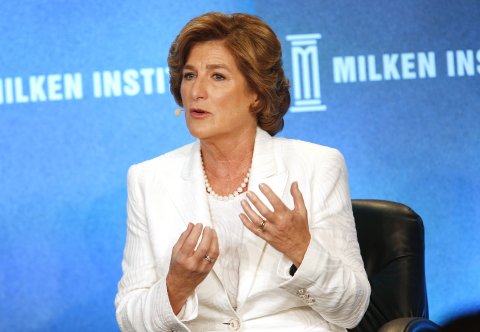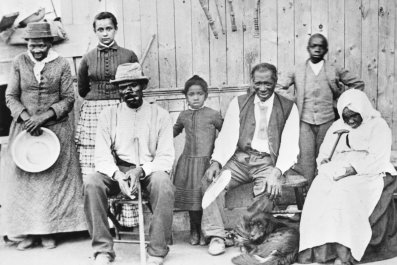The difference between women's and men's earnings is on average 18 cents per dollar earned, and even more than that for women of color. After years in which women have constituted about half of the college-educated workforce, this significant, unchanging pay gap and the lack of representation of women in the upper echelons of senior management are troubling. In fact, only a surprisingly tiny 7.8 percent of CEOs at S&P 500 companies were female at the close of 2020. Why is it taking so long to shatter the proverbial glass ceiling once and for all? This is the question asked by Harvard Business School professors Colleen Ammerman and Boris Groysberg in their new book Glass Half-Broken: Shattering the Barriers That Still Hold Women Back at Work (Harvard Business Review Press, April). They discuss institutional reasons limiting women's advancement and what can be done to eradicate them. In this excerpt from their book, Ammerman and Groysberg tackle how men can be a major part of the solution.

Allies on the Sidelines
In the aftermath of the #MeToo movement, the status of women in the workplace has taken on renewed importance and urgency. Yet even as we saw massively increased awareness translate into organizational change in business, we also began to hear worried musings from women and men in a variety of industries. Speculation that the attention to men as perpetrators of harassment would create a climate of fear among them abounded. An anxious question followed: Would men start to limit their interactions with female colleagues—withdraw their mentorship, their advice, their professional friendship? Or would the spotlight on the challenges women still face at work inspire more men to step up as allies in the battle for gender equity?
At an individual level, men who are loath to work closely with women can of course have a damaging effect on the careers of their female colleagues. But men who are apathetic about gender equality also, without necessarily meaning to, stymie women's advancement. Today we are at something of a crossroads. Women's representation in leadership roles across sectors and industries has remained virtually unchanged since the 1990s. Will men shrink from grappling with the complex and persistent conditions that perpetuate this state of affairs, or will they respond to the demand, surfaced powerfully in the #MeToo movement, that they actively work to dismantle discrimination? In the fight to create workplace cultures where women can succeed, will men retreat to the sidelines or join the battle?
Gender Equality Is a Men's Issue
Men have never been entirely absent from the struggle to expand economic access and professional opportunity for women. In 1984, the Speaker of the U.S. House of Representatives, the governors of New York and Ohio, and New York City's mayor—all men—spoke out in favor of naming a woman to the Democratic Party's presidential slate; candidate Walter Mondale ultimately tapped Geraldine Ferraro as his vice president, the first woman ever to run on a major party ticket. Ferraro's access to a prominent leadership role was the product not only of decades of activism and agitation by women but also powerful men's endorsement of those demands, a practice that continues to be important today. In 2020, Democratic presidential candidate Joseph Biden made a pledge to select a woman as his vice-presidential nominee and ultimately shared electoral victory with running mate Kamala Harris, the first woman and first person of color to be elected vice president.
In 2019, National Institutes of Health director Francis Collins issued a public call to "end the tradition of all-male panels" at science conferences, pledging to look at whether and how event organizers had worked to create diverse agendas and decline speaking engagements where inclusivity was not reflected in the program. In an interview with The New York Times about the statement, Collins noted that the #MeToo movement had impacted biomedicine and heightened his sense of urgency about creating environments where women scientists experience equal opportunity and treatment. Princeton neuroscientist Yael Niv, whose website BiasWatchNeuro.com tracks speaker gender at neuroscience conferences, explained to The New York Times why Collins' statement was so important: "People really want him at a conference—he brings the crowds. So if he says, 'I'm not coming to your conference to give the keynote speech because I don't see adequate representation,' that is huge."

Men's voices are critical because of, not in spite of, their gender. When men speak up against gender disparities or gender discrimination, they not only become visible as allies who can be counted on to support industry or company initiatives to advance parity, they also foster awareness and acceptance about gender inequity as a shared problem, not a special interest.
We interviewed a number of men who have been advocates for women's advancement in their own companies and beyond, including Doug Conant, former CEO of Campbell Soup, who saw female talent—and diversity more broadly—as central to his turnaround strategy for the struggling company upon taking the reins in 2001. "We had to craft an employee value proposition that worked for everybody," he explained. Conant knew that employee perception of inclusion and equity was low and that the company needed to demonstrate an investment in its 20,000–strong workforce. Early in his tenure, the company started its first employee resource groups, beginning with Women of Campbell: "All we had to do was sanction the first event and it went from something like 12 women to, I'm going to say, 5,000 women in about a year, all around the world. All we had to do was open the door and be supportive of the concept of women helping a company perform better."
Conant approached cultivating women leaders as an individual responsibility, too. Denise Morrison succeeded Conant as CEO in 2011, the first woman to hold Campbell Soup's top post; Conant had mentored Morrison for a number of years before Campbell's board began looking at its CEO succession needs. He recalled, "I hired Denise Morrison in a staff role as our first chief global customer officer, but then I got her into a profit-and-loss role, and she had a chance to show that she could run line businesses for six or seven years before the board had to have a discussion about my successor. At that point, she had a clear track record of contribution and experience." Boards often bemoan the paucity of women in the CEO pipeline, but Conant's example shows that this needn't be the case—if men in powerful roles today open the door for women to step in tomorrow.

Not only is men's participation necessary to change the practices and norms that limit women's advancement, but men themselves also stand to gain from disrupting the status quo. The gender hierarchy that disadvantages women creates pitfalls for men, who are penalized if they don't adhere to an idealized and rigid standard of male behavior. For men, showing vulnerability and empathy, being warm and agreeable, and expressing emotions (other than anger) have all been shown to elicit criticism. Even though these characteristics and behaviors are known to create greater trust and effectiveness within companies (indeed, executive coaches often work with clients to improve and enhance these exact traits), men who enact them are viewed as less competent and likable.
Deviating from the norm is perhaps most difficult and consequential when it comes to men's role in caregiving. Even as men's careers can be boosted by gender inequities within companies, they pay a price when it comes to life beyond work. In the early 1990s, Harvard Business Review suggested that men's expectations for work and family might be changing, noting that "the Corporate America originally designed by men doesn't work anymore for most of us," with a new generation of men looking to be more involved fathers and more equal partners. Yet nearly 30 years later, men still find themselves locked into an outmoded set of expectations that call on them to diminish and limit their commitment to caregiving and parenting. In 2015, The New York Times reported that despite having more egalitarian beliefs about gender roles than prior generations, professional millennial men were largely living the lives of their fathers and grandfathers: working long hours and doing little childcare.
This fact should come as no surprise given the way many companies approach men's parenting responsibilities: at best as an oddity that renders them suspect or at worst as a lark not to be taken seriously. Although parental leave is a standard benefit at many large employers, men take leave at dramatically lower rates than women. In 2018, the Society for Human Resource Management reported that 36 percent of men who had access to leave took the total available time off, compared to 66 percent of women. In 2019, JPMorgan Chase agreed to pay a $5 million settlement in a class-action suit initiated by a male employee who was prevented from taking advantage of the bank's 16-week leave for primary caregivers. The employee, a fraud investigator in Ohio, was told he could only qualify for the leave if he demonstrated that his wife couldn't be the child's primary caregiver. It was inconceivable to his managers that he might choose such a role, and in their view the bank's parental leave benefit wasn't intended to support men in doing so but instead was really aimed at women, even if it was on paper gender-neutral.
Men on the Sidelines
If men's full participation in combating gender-based disparities is not only necessary but also ultimately beneficial to both men and women, why don't we see more of it? Men may struggle to step out of line with traditional expectations, buy into zero-sum thinking about women's gains as men's losses or feel uncertain about their place in the conversation about gender inequality—or all three. When men act unconventionally in relation to work and family, they can risk career and reputational consequences. As a state senator, Barack Obama was harangued by a fellow legislator when he missed a vote due to his toddler daughter's illness: "To use your child as an excuse for not going to work also shows poorly on the individual's character," his fellow senator Donne Trotter told the press. These kinds of criticisms—whether explicit or unspoken—discourage men from bucking the work-above-all expectation.
Our research suggests that many men are well aware of gender inequities at work. In a 2019 survey published in the Harvard Business School (HBS) student newspaper, male MBAs ranked the severity of gender inequality at 6 on a 7-point scale, where 6 indicated "a very large problem." And in our study of HBS alumni, more than 40 percent of men said they believed gender had been an advantage to their careers. Why are only some men speaking up? "Even for men who want to engage, there's a natural question of whether we should be the people taking the lead on trying to solve these problems or whether we should be living the values of equity and stepping back so women can lead instead," explained 2019 MBA grad Matt Piltch, who worked on a number of gender equity initiatives during his time in business school. Piltch observed that some men struggled with finding their place: "If a person believes women should be empowered to solve these problems, there's a little bit of tension" that can be felt by men who want to support gender equity.
This sense of unease is well known to social psychologists who study men's sense of "psychological standing" when it comes to being advocates for women. Ironically, while men's support for equity initiatives often lends legitimacy, men themselves may feel that their voice isn't an appropriate part of the chorus. One series of studies looking at men's participation in workplace gender-parity initiatives found that men's lower participation was driven by feelings that speaking up about gender issues wasn't their place, even if they believed that promoting gender parity was important. But more crucially, the research revealed that men's sense of psychological standing could be shifted simply by talking about their stake in gender equality and highlighting the importance of men's role in such initiatives. When companies and individuals frame the work of increasing gender equity as a collective imperative, men are empowered to take part.
Men's engagement can take many forms, and there are numerous times that men's voices and their actions make a difference. Simply taking full advantage of available paternity leave—and encouraging others to do the same—disrupts the rigid, gendered expectations about caregiving that limit women's choices. Investing in relationships with female colleagues helps to even the playing field by ensuring that women have equal access to the insight, information and advice we all need to do our jobs well. Speaking up to challenge biased beliefs and comments sends a message to both women and men—one that says you are committed to the dignity and fair treatment of your female coworkers. Men's voices are powerful, and they also have real power to help fix broken systems. Because men are in so many leadership roles, they have an enormous opportunity to eradicate bias in processes like hiring, compensation and promotion. All told, men's full engagement has the potential to dramatically accelerate progress toward gender equality and shatter the barriers women face once and for all.

→ Excerpt from Glass Half-Broken: Shattering the Barriers That Still Hold Women Back at Work by Colleen Ammerman and Boris Groysberg (Harvard Business Review Press, April 2021).














